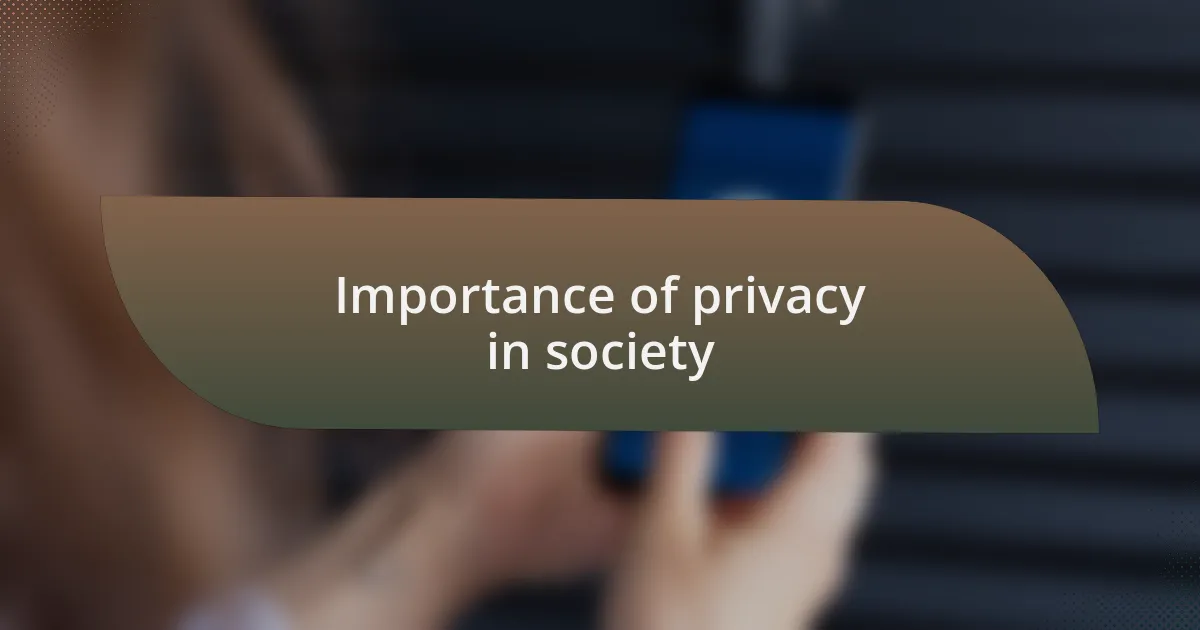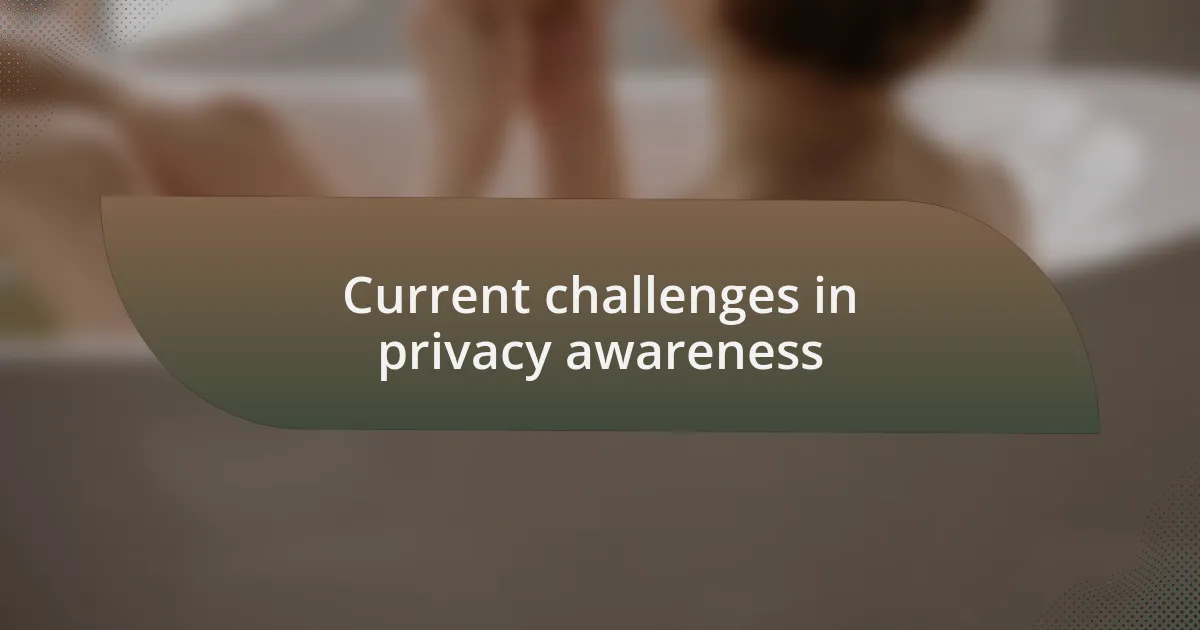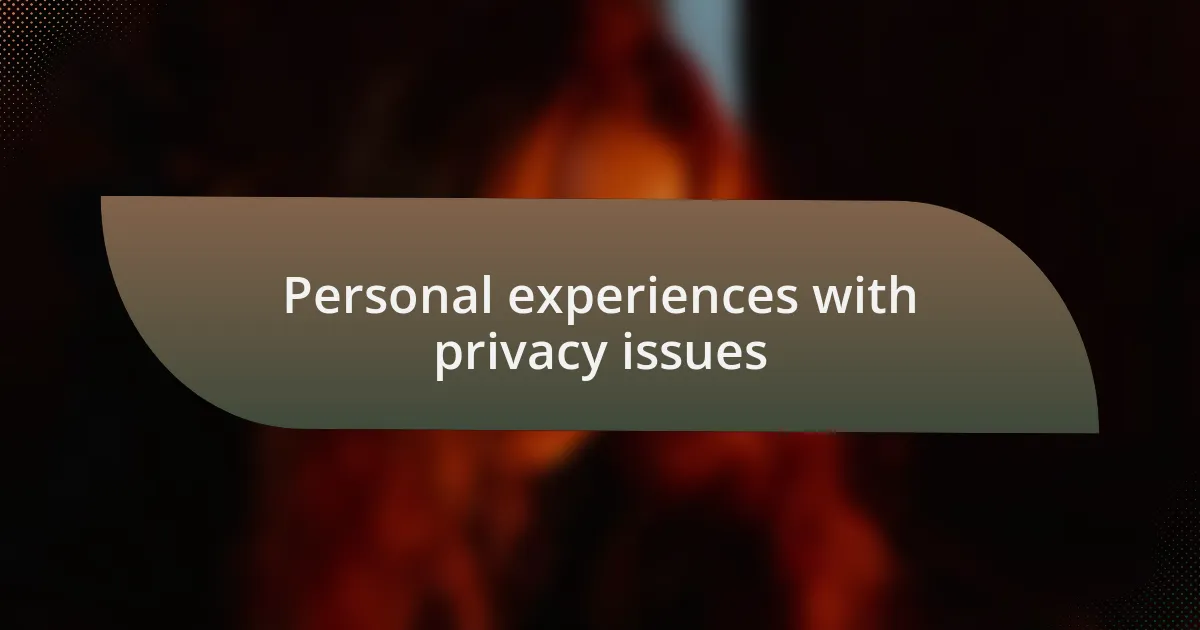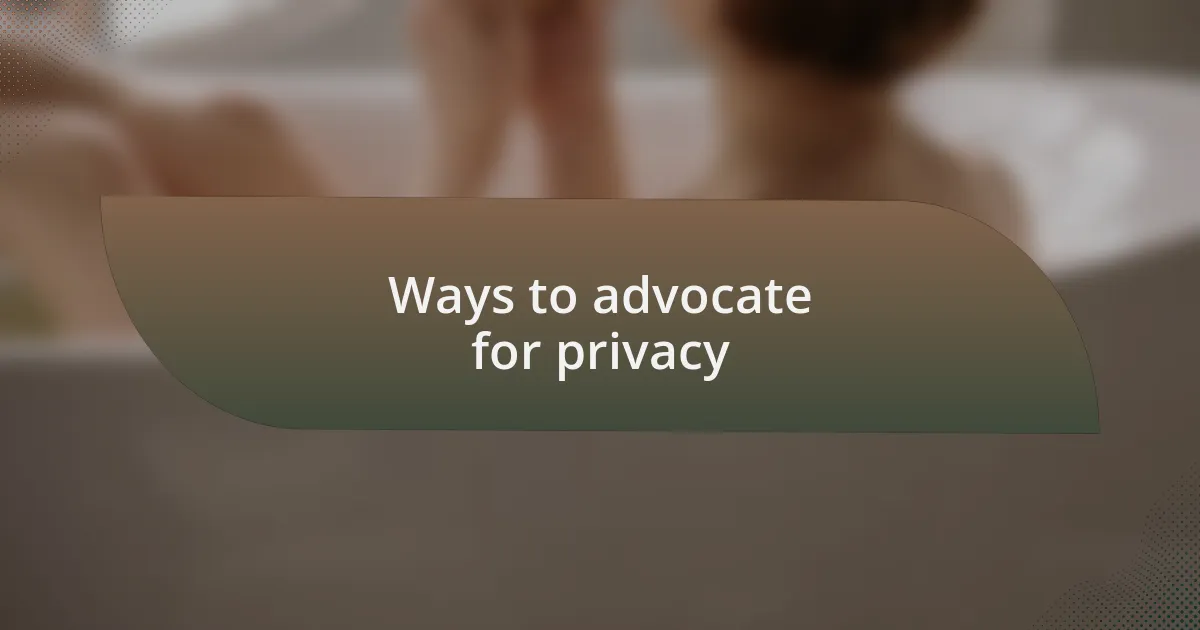Key takeaways:
- Privacy advocacy promotes awareness of digital rights and the importance of managing personal data.
- Loss of privacy can lead to diminished trust in companies and hinder healthy social relationships.
- Current challenges include complex privacy settings and misinformation about online safety.
- Practical advocacy methods include educating others, supporting privacy organizations, and practicing good digital hygiene.

Understanding privacy advocacy
Privacy advocacy is about more than just protecting personal information; it’s a movement that seeks to promote awareness of our digital rights in an increasingly interconnected world. I remember a time when a close friend of mine shared a seemingly harmless photo online, not realizing it could be accessed by anyone, anywhere. It made me question—how much do we really know about the implications of our online actions?
At its core, privacy advocacy requires us to be vigilant and proactive. I often find myself pondering, why do we overlook the importance of managing our digital footprints? Each of us has the right to control our data, yet many individuals remain unaware of the extent to which their information is collected and used.
This advocacy isn’t just about legal protections; it’s deeply personal, as it grapples with issues of trust, consent, and our ability to navigate the digital landscape safely. I’ve had moments when I felt overwhelmed by privacy policies that seem designed to confuse rather than inform. How can we expect to protect ourselves when the rules are buried in jargon? This highlights the urgent need for clear and accessible information in privacy advocacy.

Importance of privacy in society
Privacy isn’t just a luxury; it’s a fundamental right that nourishes our sense of autonomy and security in society. I think back to the time I found out my online shopping habits were being tracked by multiple websites. It felt invasive. Don’t we all deserve the tranquility of knowing that our personal choices remain confidential and free from unnecessary scrutiny?
In today’s digital age, the loss of privacy can lead to a loss of trust. I often find myself considering how reluctant I’ve become to share information with companies after realizing how easily my data could be mishandled. It’s a concerning thought—if I can’t trust how my information is used, what does that say about the relationship I have with those companies?
Moreover, privacy fosters healthy relationships within our communities. There’s something comforting about knowing that we can share our thoughts and experiences without fearing judgment or repercussions. I remember confiding in a friend about a sensitive issue and feeling a wave of relief that it would remain just between us. Imagine if we couldn’t experience that kind of security; it would fundamentally change how we interact with others. Isn’t it vital to protect that space for open dialogue?

Current challenges in privacy awareness
One significant challenge in privacy awareness today is the overwhelming amount of information sharing that occurs without our conscious consent. I recall a time when I innocently signed up for a newsletter, only to receive countless promotional emails that felt intrusive. It raises an important question: how often do we truly understand what we’re agreeing to when we click “Accept” on those lengthy terms and conditions?
Additionally, the complexity of privacy settings on social media platforms often leaves users bewildered. Recently, I spent an hour trying to navigate through the privacy options on an app I regularly use. It struck me how frustrating it is that many people, perhaps including you, might throw up their hands in defeat rather than engage with these settings. How can we advocate for privacy when the tools meant to protect us are so convoluted?
Moreover, there’s a pervasive misinformation problem surrounding what constitutes a privacy threat. I remember discussing with a friend how they believed that using strong passwords was all that’s needed for online safety. This limited understanding can lead to a false sense of security. Isn’t it disconcerting to think that many are blissfully unaware of the deeper, nuanced threats that exist? Real awareness requires more than surface-level knowledge; it necessitates a genuine understanding of the digital landscape we navigate every day.

Personal experiences with privacy issues
I remember a time when I discovered that my location data was being tracked by an app I thought was benign. It was unsettling to realize that something I casually downloaded to enhance my fitness routine was sharing my whereabouts with third parties. How many of us stop to consider the hidden implications of our favorite apps?
A few months ago, I received a shocking alert from my bank about unusual activity on my account. Panic set in as I hurried to change my passwords, fearing the worst. It made me reflect on the fragile nature of our online identities and how quickly our sense of security can evaporate. Why does it often take a scare for us to truly prioritize our digital privacy?
There was a moment when I joined a webinar on data privacy, only to be confronted with shocking statistics about data breaches. The facilitator highlighted that even large companies sometimes mishandle personal information. I left feeling a mix of disbelief and urgency—if these vulnerabilities exist at such high levels, what can I do to protect myself? It’s a constant journey of awareness and vigilance that we all need to engage in actively.

Ways to advocate for privacy
There are many practical ways to advocate for privacy, starting with educating yourself and others about digital rights. I often find that simply sharing knowledge can create ripples of awareness. For instance, after I shared an insightful article on data tracking with a few friends, I noticed them becoming more cautious about the apps they downloaded. The conversations that followed were eye-opening; it’s amazing how many of us are unaware of what we’re allowing into our lives.
Another effective method is to support organizations that champion privacy rights. By contributing to privacy advocacy groups, whether through donations or volunteering time, we can amplify our voices. I once attended a local event promoting data privacy legislation, and it was inspiring to see people come together, united in a common goal. Have you ever attended such events? There’s something powerful about being part of a collective effort to protect our rights.
Lastly, practicing good digital hygiene can be an act of advocacy in itself. I remember the difference it made when I switched to encrypted messaging apps; it felt empowering to take control of my communications. When I changed my password habits and began using two-factor authentication, I not only safeguarded my information but also set an example for my peers. Isn’t it interesting how our personal actions can inspire others to follow suit in creating a more privacy-conscious community?